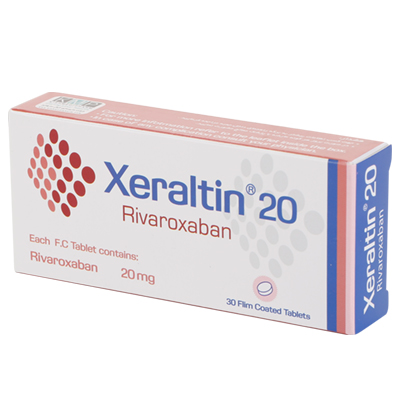Description
If you have ever heard of the name rivaroxaban, this article can definitely be useful for you and provide very useful information. What is rivaroxaban? What are its benefits and what are its contraindications? We have tried to answer these questions in full. Zerlatin tablets are actually the same rivaroxaban tablets that are produced by Kish Medipharm Pharmaceutical Company in doses of 10 mg, 15 mg, and 20 mg.
Rivaroxaban tablets are classified as cardiovascular drugs and are available in 3 blisters of 10 tablets. This drug product is an oral anticoagulant with its mechanism of action, and its mechanism of action is as follows: Rivaroxaban directly and selectively binds to factor Xa and inhibits it. Factor Xa is a key enzyme in the blood coagulation pathway that converts prothrombin to thrombin.
Simply put, rivaroxaban blocks a key step in the blood clotting process, which makes your blood less likely to clot and reduces the chance of blood clots forming in your veins. This helps prevent problems like stroke, deep vein thrombosis, and pulmonary embolism.
Uses of rivaroxaban or zertaltine tablets
Zerlotin tablets are prescribed by a specialist doctor for the treatment and prevention of various patients who are at risk of deep vein thrombosis (blood clots). Below, we have briefly mentioned some of the uses of rivaroxaban tablets:
- Prevention of stroke and systemic embolism in patients with nonvalvular atrial fibrillation
- Treatment and prevention of pulmonary embolism (PE)
- Prevention of thrombosis in patients with a history of blood clots
- Preventing deep vein thrombosis after knee or hip replacement surgery
- Treatment and prevention of deep vein thrombosis (DVT)
- Prevention of thrombosis in patients with heart disease
- Preventing pulmonary embolism after major surgeries
- Preventing blood clots in cancer patients
- Reducing the risk of blood clots in hospitalized patients with acute illnesses
Contraindications for rivaroxaban or zertaltine
Contraindications to the use of a drug refer to reasons that prevent that drug from being used in specific situations or for specific individuals because it could pose serious health risks. Rivaroxaban also has contraindications, which we will discuss, but before that, we should consider what is important to pay attention to in order to better understand the contraindications of a drug.
One of the main reasons for contraindications is the presence of underlying diseases such as kidney failure, liver failure, or heart problems that can be aggravated by taking the drug. Drug interactions are also an important factor. Some drugs, when taken at the same time as other drugs, may cause dangerous interactions that lead to serious and irreversible complications. Allergic reactions can also be another reason for contraindications, especially if the person is allergic to certain ingredients in the drug.
Certain physiological conditions, such as pregnancy and breastfeeding, can also necessitate contraindications, as some medications may harm the fetus or infant. Genetic differences and the patient's age can also be influential, as individuals' bodies may react differently to medications. For these reasons, determining the need for or contraindications to a medication should be done under the supervision of a physician and based on his or her accurate diagnosis to avoid risks and side effects.
One of the most important parts of the brochure and box of any pharmaceutical product is its contraindications, so be sure to read this thoroughly. Remember that before starting any medication, it is necessary to inform your doctor about your condition. Informing the doctor about the medications you are taking, your medical history, and genetic diseases can be of great help to the specialist. Rivaroxaban tablets are also not suitable for everyone, and the doctor may recommend alternative treatments. Below are some of the contraindications for Zerlotin tablets:
- If there is or has been a history of bleeding (cerebral bleeding or stomach bleeding)
- History of liver disease or other conditions with a risk of bleeding
- If you are being treated with medications such as aspirin and anticoagulants such as coumarin and other medications such as heparin, apixaban and clopidogrel and taking heparin to keep blood vessels open
- Hemorrhagic strokes
- High and uncontrolled blood pressure
- Gastrointestinal bleeding and ulcers in the stomach and intestines
- Patients with a history of allergic reaction to rivaroxaban or any of the components of this drug
Side effects of rivaroxaban or zertaltine tablets
Side effects of rivaroxaban tablets can occur due to different problems, including the causes of side effects due to the use of this medicinal product can be excessive or less than the doctor's recommended dose, duration of use, the individual's medical conditions, drug interactions, allergic reactions, diet and lifestyle, individual genetics, age and gender. Side effects of rivaroxaban tablets can be mild, moderate to severe, and if any complication recurs, the person must immediately go to the emergency room. Some of the side effects of rivaroxaban may disappear over time as the body gets used to it, such as skin problems and muscle cramps, of course, the attending physician is responsible for examining and monitoring these cases. Below we have briefly described the side effects of rivaroxaban tablets:
- Back pain
- Bleeding gums
- Bloody, dark stools
- Bowel or bladder disorder
- Tingling sensation in the skin
- Coughing up blood
- Difficulty breathing and swallowing
- Dizziness and headache
- Increased vaginal and menstrual bleeding
Nosebleed - Burning sensation during urination, painful and difficult urination
Abdominal or stomach pain or swelling - Blistering or peeling
- Loose skin
- Blurred vision and difficulty seeing
- Coughing or hoarseness
- Skin rashes such as itching and hives
- Aversion and loss of appetite
- Feeling pain in the back and sides
- Bad breath
- Unusual bleeding or bruising
- Unusual fatigue or weakness
- Yellowing of the skin and eyes
- Muscle cramps
- Discharge from wounds
- Pain in the hands and feet
- Vomiting blood
- Diarrhea
- Fast or irregular heartbeat
- Fever with or without chills
- Leg weakness
- Numbness and paralysis
- Prolonged bleeding from cuts and wounds
How to take Rivaroxaban tablets
So far, we have tried to provide you with all the information needed by the user of Zertalin or Rivaroxaban tablets. Remember that the dosage and time of taking this medicine must be announced by the specialist and treating physician. In the following, we will explain further the additional points of using this anticoagulant medicine:
- Reducing the risk of systemic embolism and stroke in patients with non-valvular atrial fibrillation with creatinine clearance results above 50 ml/min: 20 mg once daily with meals and in the evening; in patients with non-valvular atrial fibrillation with creatinine clearance results up to 50 ml/min: 15 mg once daily with meals and in the evening.
- The dosage and method of taking rivaroxaban vary depending on the patient's condition and type of disease and should be taken exactly as prescribed by the doctor.
- Treatment of deep vein thrombosis (DVT) and pulmonary embolism (PE): Initial dose of 15 mg twice daily with food, followed by a maintenance dose of 20 mg once daily with food for 21 days.
- Reducing the risk of recurrent deep vein thrombosis (DVT) and pulmonary embolism (PE) 20 mg once daily with meals
- Prevention and prophylaxis of deep vein thrombosis (DVT) following hip replacement surgery (10 mg once daily until day 35) and joint replacement surgery (10 mg once daily until day 12)
- The effects of rivaroxaban on the fetus are still unknown and it can cause bleeding complications during delivery. This drug is classified as category C for use during pregnancy and you should definitely consult your doctor.
- All pharmaceutical products should be stored in a dry, moisture-free place.
- Store Zerlatin tablets at a temperature below 30°C, away from sunlight.
- Rivaroxaban tablets should be kept out of the reach of children.
- Avoid using expired medications and dispose of them properly.
- Rivaroxaban tablets are not recommended for people under 18 years of age.
- If you miss a dose, take it as soon as you remember and avoid doubling the dose if it is almost time for your next dose.
- Do not stop or discontinue use of rivaroxaban without consulting your doctor.
- Rivaroxaban tablets cause drowsiness and lethargy, so you should remember to avoid operating machinery and driving while taking this medication.
- If surgery is required, the doctor must inform you of the amount and timing of medication before and after surgery.
- Periodic tests and evaluation of signs and symptoms of neurological disorders, kidney and liver function disorders, monitoring for decreased hemoglobin or hematocrit, complete blood cell and platelet counts, and tests for occult blood in the stool are recommended.
- If the surgery involves a catheter or intrathecal injection, medication should be taken before or after the catheter is injected or removed exactly as directed by the doctor. If numbness or weakness in the legs or bowel and bladder problems occur after the anesthesia is over, the doctor should carefully examine the patient.
- If you are taking rivaroxaban tablets simultaneously with medications such as aspirin and other nonsteroidal anti-inflammatory drugs, other anticoagulants, antifungal medications such as ketoconazole and itraconazole, carbamazepine, phenytoin, phenobarbital, rifampin, or herbal remedies and vitamins, be sure to consult a specialist.
Conclusion
Rivaroxaban tablets, by directly and selectively inhibiting factor Xa, prevent the formation of thrombin and thus the formation of blood clots and are used as an anticoagulant. This drug is produced and supplied by Kish Medipharm Company under the trade name Zerlatin in doses of 10, 15 and 20 mg. Zerlatin tablets are prescribed for the prevention and treatment of various patients who are at risk of thrombosis or blood clots on the advice of a physician. Treatment of pulmonary blood flow obstruction and pulmonary embolism are other uses of Rivaroxaban tablets.
It should be noted that all of the above is only for the purpose of raising public awareness and introducing the product Rivaroxaban or Zerlotine tablets and will not replace the recommendations and instructions of your doctor. The recommended dosage and time of this medicine should not be other than the doctor's instructions and you should strictly avoid stopping the medicine or taking it arbitrarily.





Reviews
There are no reviews yet.